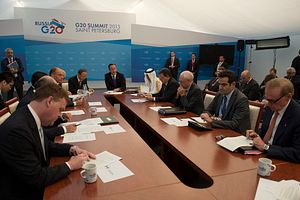This month’s G20 Summit in Hangzhou is widely seen as an opportunity for China to once again display its credentials as an equal partner of the West on the global stage. This year’s summit is expected to highlight especially strongly policies and themes relevant to Asian interests. There is hope also that the G20 will promote better bilateral relations between India and China and Japan and China.
However, for the G20 to truly represent Asian aspirations and have a global impact, it needs to be more inclusive and expand to encompass some more powers, perhaps becoming a G30. With the rise of numerous Asian institutions such as the Asian Infrastructure Investment Bank (AIIB) and the Shanghai Cooperation Organization (SCO), it is clear that the institutions of the 21st century will largely be shaped by Asian countries. It is therefore reasonable that one of the chief vehicles of global economic governance have more Asian members.
The G20 has always been somewhat of an arbitrary group of nations. It is actually composed of 19 countries, the twentieth member being the European Union (EU). It is not merely a selection of the 20 largest economies in the world in any given year, but a fixed group of countries selected for geopolitical as well as economic reasons, as the Norwegian government pointed out in a criticism of the organization:
The G20 is a self-appointed group. Its composition is determined by the major countries and powers. It may be more representative than the G7 or the G8, in which only the richest countries are represented, but it is still arbitrary. We no longer live in the 19th century, a time when the major powers met and redrew the map of the world. No one needs a new Congress of Vienna.
President Barack Obama of the United States acknowledged the frustrating and arbitrary nature of the group’s membership without directly advocating for any changes:
everybody wants the smallest possible group that includes them. So, if they’re the 21st largest nation in the world, they want the G21, and think it’s highly unfair if they have been cut out.
Since the G20 was founded in 1999, numerous countries have complained against their lack of inclusion in the G20. One, for example, was Spain, the world’s 14th largest economy by nominal GDP. A way was found to include Spain by inviting it as a permanent guest to all G20 meetings, which is a good precedent for including other countries in a similar manner. On the whole, however, European countries are fairly well represented at the G20 summits because of their membership in the EU.
Undoubtedly for the group to remain relevant and sufficiently elite, it has to impose limits on its membership. However, a strong case can be made for the addition of at least ten more powers, mostly from Asia or the Middle East (and perhaps Nigeria and Poland), in order to better reflect the economic and geopolitical realities of the world. While a strong economy should be the key consideration, other geopolitical factors should also be taken into account. For example, Central Asia as yet has no members at the table, and the addition of a major energy and transportation hub like Kazakhstan would be welcome.
Of all the countries not included in the G20, Iran, in particular comes to mind as a necessary addition for any future expansion. It occupies a geographically pivotal region of the world and its regional rivals, Turkey and Saudi Arabia are already part of the G20. Iran itself was larger economically than Saudi Arabia until the Islamic Revolution, war, and sanctions destroyed its economy. Nonetheless, it is still the 18th largest economy in the world by purchasing power parity (PPP) and sits on the second largest natural gas reserves in the world. If it is the goal of world powers to reintegrate Iran into the community of nations, Iran should not be excluded for political reasons. In addition to Iran, the Middle East can also contribute Egypt.
Moving further east, a good case could be made for the eventual addition of Pakistan and Bangladesh. With their large populations, both those countries could become the largest economies of the 21st centuries with the right policies, as proposed by Goldman Sachs when it included them in its list of the Next-11 economic powers of the future. The Next-11 list also included Vietnam and the Philippines, which along with Thailand and Malaysia would be other prime candidates for becoming part of a larger global economic forum. Finally, a couple of global economic centers, particularly Singapore and the United Arab Emirates (UAE), despite being relatively small, should also be key players in any attempt to shape global economic institutions to reflect Asia’s clout.
Unlike the United Nations Security Council (UNSC), the G20 is flexible. The G20 itself is already an expansion designed to include more countries than the original G7/G8. It is not inconceivable for it to become a G30. A major power and organizer like China should take the initiative — it wants to rebalance many global institutions away from the West anyhow — and seek to push for permanently including a few more non-Western powers in an expanded organization.

































